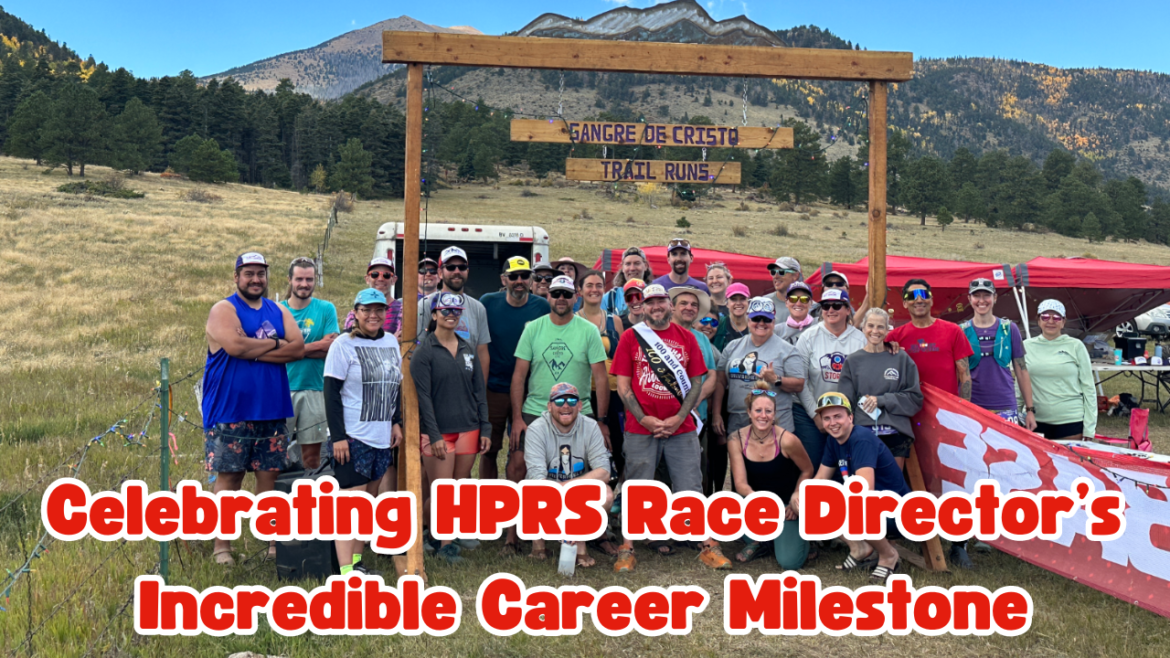Westcliffe, CO –
As the final runner crossed the finish line of last week’s Sangre de Cristo Trail Festival in Westcliffe, a different kind of milestone was reached by an event attendee. In the sport of ultra running, we celebrate the many course records, world records, and personal bests of tens of thousands of athletes. We also celebrate world championships, the top 3, age group winners, DFLs, best blood, most miles run at timed events, and countless other accomplishments of note.
Few can deny that we seldom celebrate race directors, the individuals for whom without them the many things we celebrate would probably not exist, or at least in a different form. At the very minimum of recognition for race directors in our sport, there is no race director of the year, no celebrated accolades outside induction into a state’s “Running Hall of Fame.”
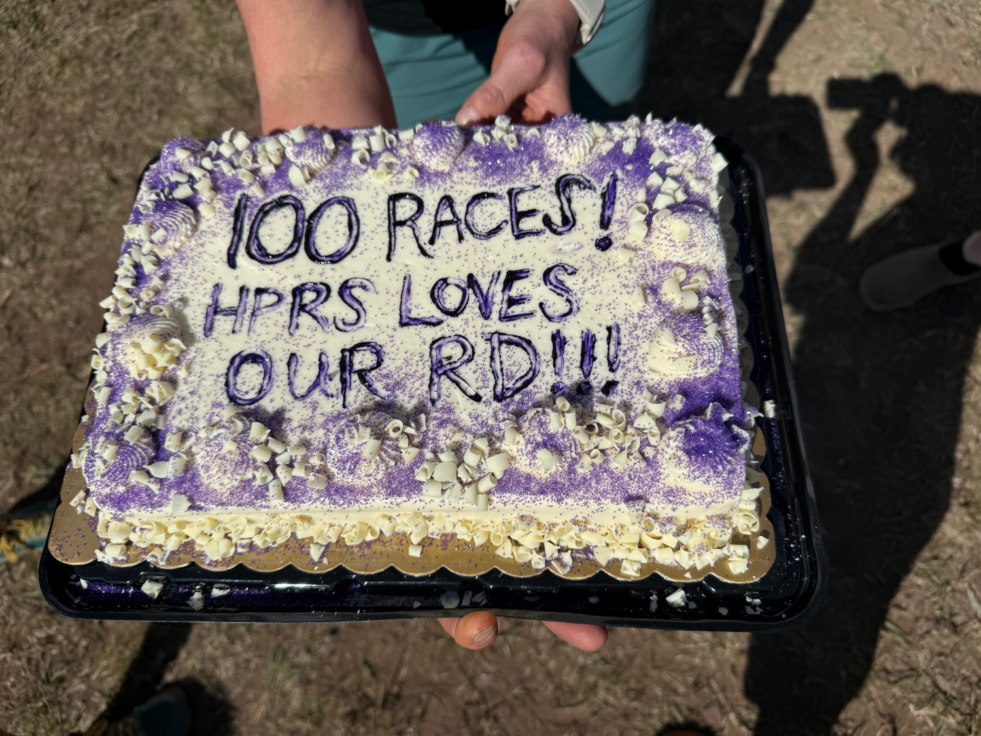
What makes this milestone so very different, and even unique amongst the many things we celebrate in our sport, is that so few have ever attained entry into this kind of “100-club.” That being the club HPRS owner and race director John Lacroix entered this past Sunday.
In open ranch land populated by event attendees, many of whom attended solely to celebrate John’s milestone, he struggled to find words from beneath the raw emotion he displayed as tears of undeniable exhaustion and pride. At the finish line of the Sangre de Cristo Trail Festival, John had completed directing his 100th trail running event of his decade long career.
The first ultra distance John ever ran was a “Fat Ass” event he created in New Hampshire’s White Mountains in June of 2005. A small group run around the “Pemi Loop” that was attended by a “who’s who” of New England ultra legends of the time. A “Fat Ass” is a glorified group run within the sport of ultra traditional known for its motto of “No Fees, No Awards, No Shirts, No Aid, No Whining.”
Starting in 2007 John involved himself with Peak Races, held in the Green Mountains of Vermont, as a race director apprentice under race director Andy Weinberg. John served as an apprentice for 4 annual events held in Pittsfield at the home of Spartan Race co-founder Joe Desena. It was through this experience that John learned the many ins and outs of race direction on his way to directing his first race in November 2008; The New England Ultras featured distances of 50-Miles, 100-Miles, and the first single stage 200-Mile ultramarathon in the world.
After his experience in directing his first event, John swore off race directing altogether and focused his attention back to serving the New England ultra community by continuing his volunteerism with Peak Races in Vermont and hosting numerous annual Fat Ass runs in New Hampshire until he moved to Colorado in 2011.
Upon arriving in Colorado, John immediately created a Fat Ass Series in Colorado’s Front Range mainly in an area stretching through Loveland, Boulder, Golden, and Douglas County. The first Fat Ass he created was run by himself and one other runner in the Summer of 2011. By the late winter of 2012-2013, John’s “Human Potential Fat Ass Series” was averaging anywhere from 85-125 runners per run through its termination in the winter of 2015-2016. To this day it remains the most attended Fat Ass Series in US history.
Unable to find work in other areas, it was members of the community John built through his Fat Ass Series who held an intervention of sorts to convince him to make race directing his full-time job. The Human Potential Fat Ass Series was transformed into Human Potential LLC (dba. The Human Potential Running Series) in March of 2014. John held his first official Colorado race in September 2014, The Tommyknocker Ultras 100k and 55k on United States Forest Service lands in Divide.
Over the next decade, John worked to build HPRS into the largest series of trail running, and ultrarunning, events in the state of Colorado; and the 2nd largest ultra series (by number of races) in the nation. At its largest HPRS was home to 15 trail running events per year, all with an ultra-distance present. Today, HPRS is host to 12 yearly events on their calendar. Over the last decade near 14,000 runners have attended HPRS events, more than 11,000 of those in the last 5-years.
John’s vision has always been to maintain a trail and ultrarunning series more akin to the type of events one would typically find in the eastern states; Grassroots, low frills, community led and facilitated “family reunions.” Community focused events where attendees just so happened to also be running an ultra.
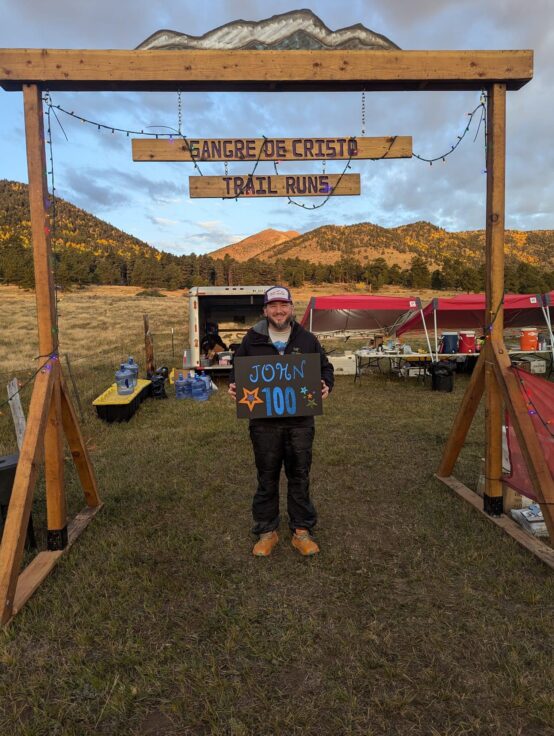
Most impressively is that John has for the most part been a one-man show at the helm of HPRS as the only employee of record for the entirety of the decade. He has from time-to-time welcomed volunteer support through the likes of advisory boards, focus groups and short stints with volunteer coordinators. Ultimately all the behind-the-scenes work and business minutia leading up to race day at HPRS has been performed by just one person, where other series of similar size employ 3-5 individuals to help with the many behind the scenes details of event production.
On this fact Lacroix states, “When I started HPRS, there was an established Colorado race director who called me, literally three days after we registered the LLC, and the entire conversation was to convince me not to become a full-time race director. Which is funny because, during that intervention days before, I had argued all the reasons why I shouldn’t be a race director. I honestly didn’t want the job, but they wouldn’t take ‘no’ for an answer. I was willing to give it a whirl.
The reasons the other RD gave me was that it was “far too much work to make so little money, its mostly under appreciated, and I owed it to my wife and kid to find a more financially stable career.” When really, the true reason for the call was to scare potential competition away. They didn’t want another race nearby on “their weekend.” It was disingenuous and I was offended.
For a decade I have sought to prove that race directors can make an honest living through hustle, without relying on sponsor dollars, all while pricing our events at prices below the industry average. I had to prove that it can be both incredibly hard work, and enough to make a living off without taking advantage of people’s wallets, even if it is at times under appreciated. I knew that the key to the equation was community, that’s what I had learned back east, and I knew it could work out west. That RD’s phone call was the kick in the ass I needed. I needed to prove them wrong. I hate when people tell me I can’t, won’t, or shouldn’t do something. That’s what made me a better ultrarunner in the first place.”
At the conclusion of Sangre de Cristo, John has now directed 100 running events, thats 100 weekends of activities for trail runners. 92 of those events held in Colorado, a state record, he has also directed events in Vermont, Arkansas, and Texas. Through his 100 total events directed, John hosted 284 individual distance races, 189 of those being an ultra-distance. John’s 189 ultra distance races directed is second all time in US history behind Wendell Doman of California’s Coastal Trail Runs, who has been race directing ultras since 2009. No other race director of ultramarathons has directed as many ultra distance events as John over the last decade.
In 2020, 2021 and 2022 he was the only race director in the world, of a major series of races, to host his full schedule of events without a single cancellation despite the challenges of the Covid-19 pandemic; and did so without a single report of participant transmission of the virus. John’s leadership set the standard for in-person running events by being the first to publish a black and white plan for hosting in-person events during the pandemic.
John is also a polarizing figured, considered by many to be one of the more controversial figures in the sport of ultrarunning, while others consider him a thought leader. He has been a longtime advocate for crafting a more inclusive and accessible sport that celebrates the everyman and everywoman over the elite. His message has long focused on inclusivity, diversity, equity, equality, accessibility, and the need to abolish elitism. He has long championed the fight against the corporatization of the sport. It is John’s willingness to challenge the accepted norms in trail and ultra-running, by asking the community to think deeper, ask bigger questions, and to try to see a much bigger picture of the issues ultra faces, that has led to him being one of the sport’s more controversial figures on his path to building a more universally accessible sport.
Despite the many harsh opinions out there about John’s intentions and certainly about his delivery of the issues he is most passionate about; John has continued to push forward on his mission and vision. HPRS was the first race series in the nation with a black and white policy that recognized trans men as men, and trans women as women. It was the first series to allow registrants to self-identify as more than just Male, Female, or other/non-binary. Instead, HPRS allows registrants to choose one of seven gender identities during the registration process. It was also the first series in the nation to allow runners to decide if their gender identity is visible in race results. It was also the first race series sponsored by a cannabis brand.
HPRS has also created a first of its kind “Community Fund” that members of the community can donate their earned volunteer credits and comps to. Individuals can also donate cash to the fund to help pay for the entry fees of runners in need. This fund is accessible to BIPOC and LGBTQIA+ community members, anyone under the age of 30, and anyone aged 30 or over who are experiencing financial hardship. The HPRS Community Fund is a positive reminder of the community Lacroix has built surrounding his events.
Outside of HPRS, John also served as the volunteer race director of the World Championship Pack Burro Race in Fairplay, CO during 2021 and 2022. He also co-created and directed the Latino Ultra Nature Adventure (LUNA) alongside internationally recognized non-profit Americas for Conservation + the Arts in the fall of 2023 and spring of 2024. LUNA is an event that sought to open the world of mountain adventure to a traditionally marginalized group. Through the two LUNA events, John had the pleasure of welcoming the Tarahumara from Mexico’s Copper Canyon (who refer to him as “The Godfather”) and was recognized along with AFC+A for their impactful work in service to the Latino community by Colorado Governor Jared Polis and US Senator John Hickenlooper.
John also played a pivotal role in the establishment of Obstacle Course Racing in North America as one of the original founders of the Peak.com Death Race, the event that would ultimately give birth to Spartan Races. He has helped design several obstacle racing courses in both Vermont and Colorado starting as far back as 2007.
More than just race directing, John has focused a tremendous amount of volunteer time towards advocacy efforts that directly impacts trail and ultramarathons in ways few ever think about, and on both a state and national level. Since 2017 he has been a member of the Outside 285 Partnership, a regional planning effort focused on identifying opportunities for trail improvements and wildlife habitat conservation within public lands surrounding the US-285 corridor southwest of Denver. He was also a member of the Executive Committee of Fix CRUS (Colorado Recreational Use Statute) playing an integral role in working to protect and expand free public access to private and public lands in Colorado by helping to write Colorado SB-58.
He also serves on the Policy Committee for the Coalition for Outdoor Access (COA), a nationwide group of outdoor industry leaders who are advocating for laws and policies that support and encourage guided outdoor recreation and education activities on public lands and waters. His work on the Policy Committee has focused on improving the permitting process for Special Event Use authorizations on Federal Lands, protecting trail and ultra events from confusing and outdated bureaucratic policies. John is the only representative from the trail and ultrarunning community on these committees, working to back up his belief that we must leave it better than we found it.
John’s involvement in ultramarathon running extends beyond his role of race director and advocate. He has run in over 50 ultra distance group and/or journey runs, and 75 official ultra-distance events throughout the United States most heavily participating from 2005-2017. He has completed an official ultra every year for 19 consecutive years (2005-2023), finishing one in each decade of his 20s, 30s and 40s. He ran his first 100-Miler in 2007 and has since run 100-miles or more 24 different times, also finishing one in each decade of his 20s, 30s and 40s. Most notably, John is a two-time finisher of the Western States 100-Mile and a six-time finisher of the Vermont 100-Mile Endurance Runs.
In 2008, he became the first person to run 125-miles non-stop from the western-most to eastern-most points of New Hampshire. He then repeated the journey in 2009 and remains the only individual to have done so. In 2017 he became the first person to attempt to run from the lowest point of Colorado to its highest. While an early season snowstorm interrupted his 303-mile run, he ultimately ran 202 miles before summiting Mount Elbert at 14,439′, in 4 1/2 days.
While John has amassed an impressive resume as a race director, policy advocate, and accomplished runner in his own right, it has not come without putting his character flaws on full display, as can be true for any individual with a high visibility occupation.
John states, “While it certainly has been an incredible journey the last twenty years as an ultrarunner and ten years as a full-time race director, I cannot deny that I’ve certainly made countless mistakes along the way. As a race director I am also a business owner whether I like it or not, a concept that was hard to admit and grasp a full handle of during the early years of the RD journey. It is nearly impossible to please everyone, especially in a sport as niche as ultra.
Over the years I have for sure made terrible decisions and countless mistakes. I have put my character flaws on full display. I have hurt and angered dozens of runners, some of whom I’ve never even met. I don’t know another race director who hasn’t as well. I have learned far too many lessons the hard way at the expense of my business and the community that surrounds it. I cannot help but feel some remorse and wish I could turn back the clock to make better decisions along the way. I guess that’s what makes all of us human. I wouldn’t be who I am today, and HPRS wouldn’t be what it is today, had I not made those mistakes and learned those lessons along the way.
The main thing that has made ultrarunning so special to me, and many others, is that community has generally always come first. We’re a group of broken and imperfect people, on a mission to reach better self-awareness and self-enlightenment. I’m lucky that those who understand this about our sport, and each other, are as forgiving and supportive as they are. I hope someday to reach the level others expect of me, if for no other reason than to be a better leader for those I directly serve. The silver lining is the tremendous amount of personal growth this journey has afforded me. My entire adult life has been anchored in ultramarathon running, a sport that affords all of us an opportunity to realize a better version of ourselves.
I’m lucky to have the love and support that I have from those I serve at HPRS. If you had asked me a decade ago if I thought I’d make it to 100 events directed, I would have laughed hard. Yet, here we are. It’s a proud moment for HPRS. Without our runners and volunteers, I am no one and nothing. I thank them for allowing me to serve them in this way. It truly is the highest privilege and honor of my life to serve you in my role as race director. Thank you.”
John continues his race directing journey on October 12th as he hosts the Indian Creek Trail Runs in Sedalia, CO. The event is the longest running event on the HPRS calendar, now in its 11th year. To learn more about the Indian Creek Trail Runs, Race Director John Lacroix, and the Human Potential Running Series please visit www.HumanPotentialRunning.com
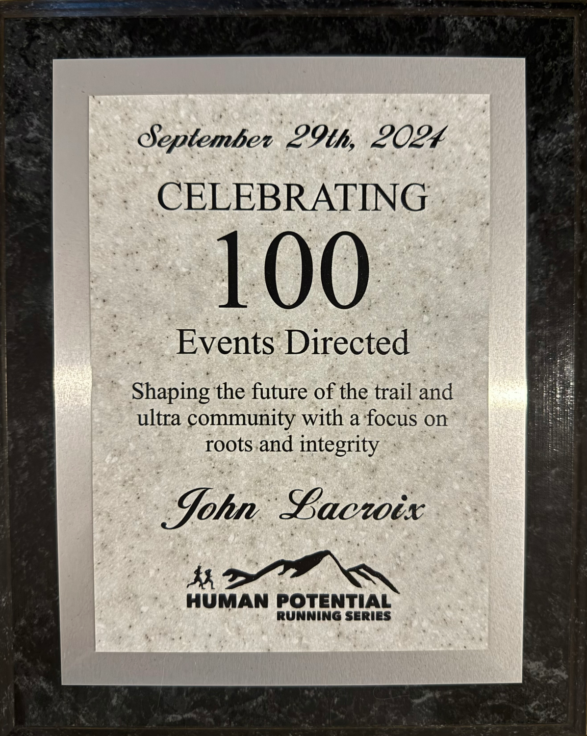
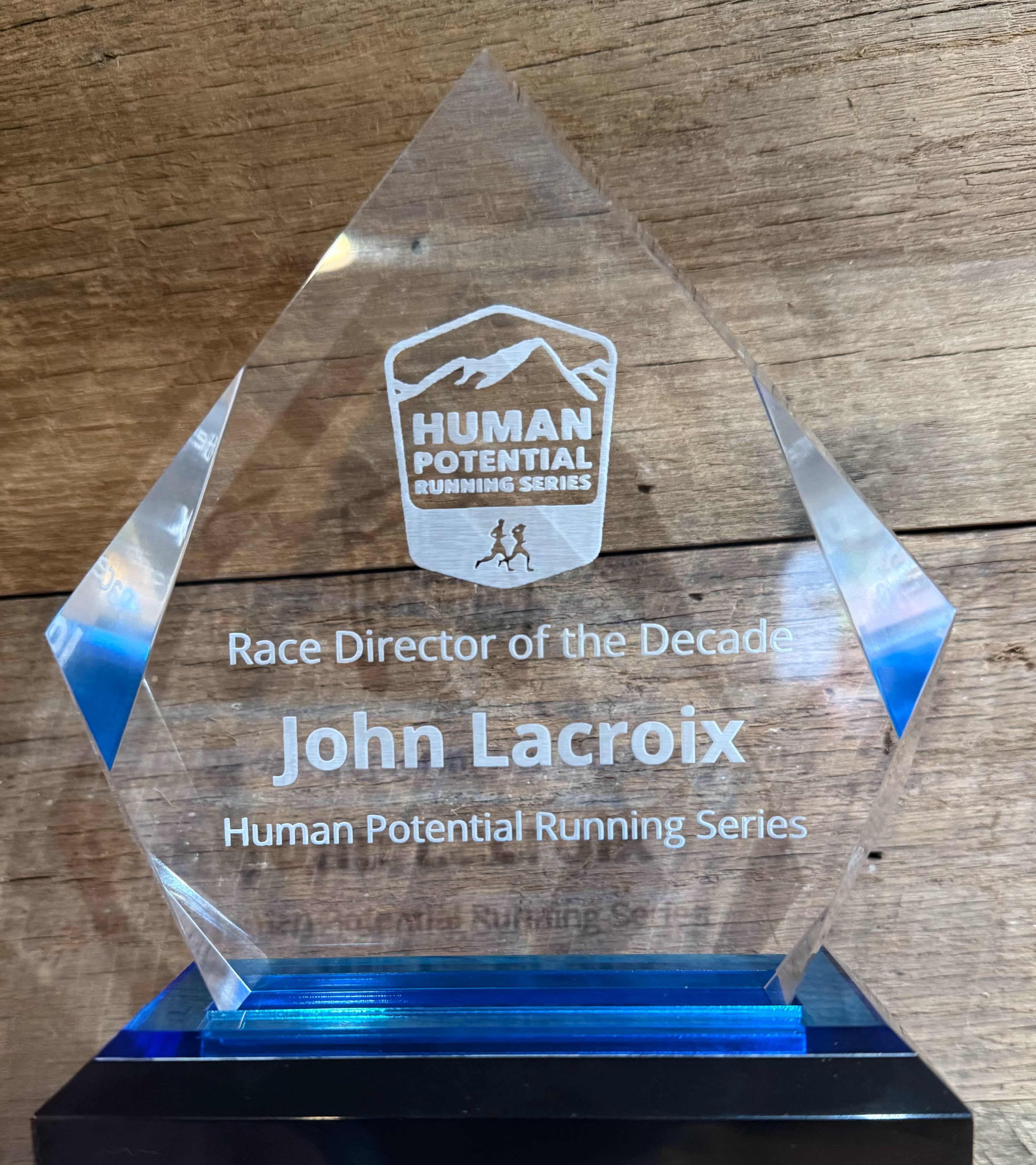
Members of the HPRS community presented John with the awards above during his 100th milestone celebration.

